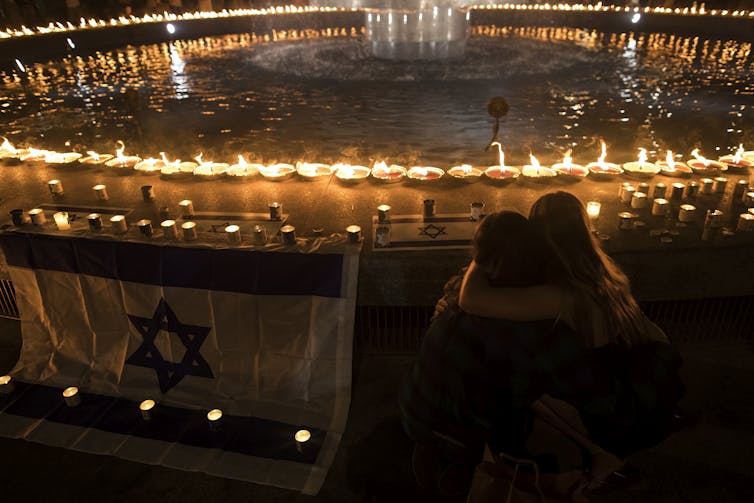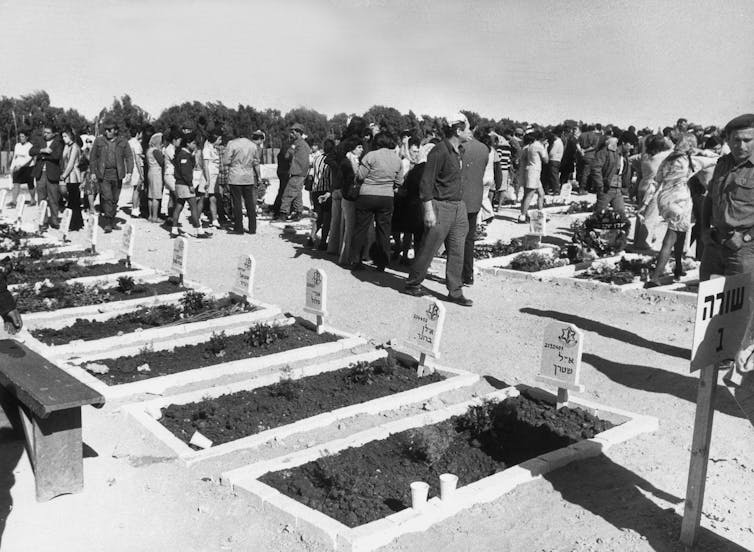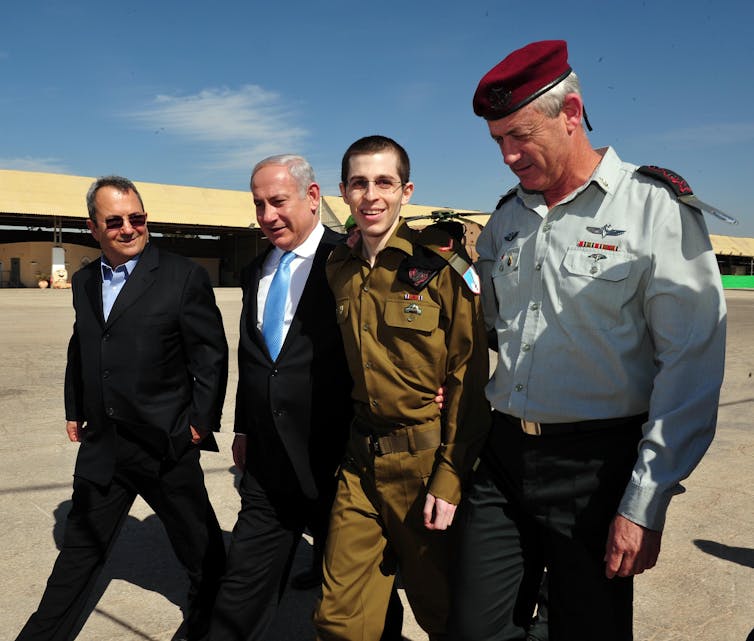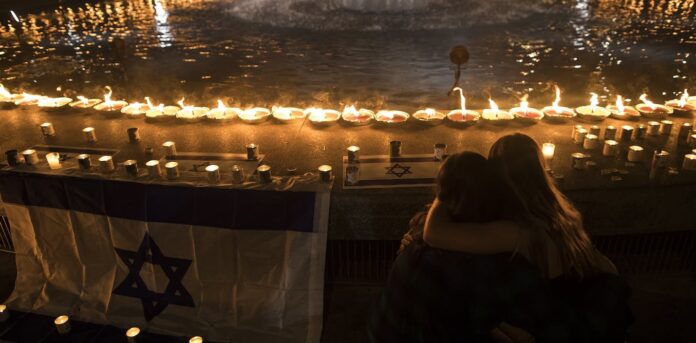Reflections on hope during unprecedented violence in the Israel-Hamas war

On Yom Kippur in 1973, I was 6 years old and living in Petah Tikvah, a city in central Israel. Playing a nail-biting game of marbles, I initially ignored my mom calling me from our front porch. But sensing something was wrong, I gave up my potential winnings and ran home.
I arrived to see my dad emerge from our front door wearing an Israel Defense Forces, or IDF, olive-green uniform. He hugged and kissed me goodbye. He then disappeared for nearly two weeks.
Every night, as instructed by the IDF, I switched off my bedroom lights to avoid enemy aircraft detection. Every day, I heard adults discuss the government and military’s failure to anticipate and intercept the surprise Egyptian-Syrian attack that killed 2,656 Israeli soldiers.
Fifty years later, on another Jewish holy day, Simchat Torah, I hopped out of bed in my home in central Pennsylvania at 6 a.m. – an hour before my twin 6-year-olds usually awaken on Saturdays. I’m a documentary filmmaker, and I had planned to use the uninterrupted time to start scoring my post-Holocaust documentary, “Cojot.”
A barrage of messages from family and friends stopped me in my tracks. Hamas had launched a surprise attack on Israel. Before my brain could process the news, my stomach told me that this was unprecedented.
Around-the-clock calls, texts and media reports from Israel have reinforced my feeling that we’ve never seen anything like this before. At the same time, certain aspects of the Israel-Hamas war are familiar. They remind me of previous conflicts, acts of terrorism and retribution in Israel and the surrounding region.

Plenty of similarities
Palestinians and Jews have been maligning, menacing and murdering each other since the 19th century.
The era of extreme violence began in the 1920s, when clashes between Palestinians and Jews slayed hundreds of people in each group.
Since then, Palestinian terrorism has claimed the lives of more than 10,000 Jews, mostly civilians. In the past 15 years, IDF attacks have killed more than 6,000 Palestinians, many of them civilians.
On Oct. 7, 2023, Hamas murdered an estimted 1,300 Israelis and abducted about 150 people, including civilians ranging in age from infants to the elderly, as well as Israeli soldiers and Americans.
Terrorists have taken hostages on Israeli soil before.
In 1974, a terrorist group called the Democratic Front for the Liberation of Palestine, or DFLP, entered Israel through Lebanon and took 105 Israeli children and 10 adults hostage in the northern Israeli town of Ma’alot.
The IDF botched its attempt to rescue the Ma’alot hostages. Its rushed operation spurred the terrorists to kill 22 children and three adults, as well as injure 68 other hostages.
For many Israelis, Saturday’s attack was also reminiscent of 2006, when Hamas kidnapped a 19-year-old Israeli soldier named Gilad Shalit.
Hamas exchanged Shalit five years later for more than 1,000 Palestinian prisoners held in Israel.

Not the first military misstep
Hamas’ surprise attack in October was not the only disaster the IDF did not foresee. The Israeli military also failed to foil Egypt and Syria’s Oct. 6, 1973, attack on Israel.
Another similarity between then and now involves Israeli and Palestinian civilians being fired on from outside either Israel or Gaza.
Thirty years ago, Iraqi President Saddam Hussein shot 38 Scud missiles at Israel in the 1991 Gulf War, during which a U.S.-led coalition pushed Iraqi forces out of Kuwait.
Although many of the Iraqi missiles splashed into the Mediterranean Sea, grazed open fields or caused little damage, they generated panic throughout the country. The missiles directly killed two Israelis. But the missiles also resulted in the deaths of 12 other people, some of whom succumbed to heart attacks.
Residing in a nation surrounded by enemies means living in fear.
Just as many differences
For Israelis, the most striking differences between now and then are the Oct. 7 terrorist attack’s unimaginable brutality and destruction. Few pictured Hamas wreaking ISIS-style havoc on 20 towns, raping women and murdering children.
Hamas murdered many more Israelis in one day than Palestinians killed during the entirety of the Second Intifada, a major West Bank and Gaza uprising that lasted from 2000 through 2005.
Another difference is the unconditional, full-fledged U.S. government support for Israel during this current conflict.
Since the 1980s, the U.S. has maintained a strategic alliance with Israel. But the U.S. has tended to offer support with certain conditions attached. For instance, Israel must spend at least 75% of the nearly $4 billion the U.S. gives it each year on American weapons and products.
Some observers say President Joe Biden has swiftly shown Israel the kind of unconditional love that Israelis want.
“The loss of innocent life is heartbreaking,” Biden said Oct. 10. “Like every nation in the world, Israel has the right to respond – indeed has a duty to respond – to these vicious attacks.”
Israelis are so moved that they’ve put up billboards to thank Biden.
America’s unconditional love may crack as Israel pursues an unprecedented goal: to rid the world of Hamas.
No Israeli prime minister has ever set such a goal, much less officially led such an effort. During the 1982 Lebanon War, Israel’s then-Prime Minister Menachem Begin sought to keep the northern border free of Palestinian terrorists. But he never aimed to eradicate the Palestinian Liberation Organization from the face of the earth.
Israeli Prime Minister Benjamin Netanyahu’s 2023 kill-them-all objective when it comes to Hamas has become the war’s flashpoint. Many people in Israel worry about this mission claiming the lives of countless civilian Gazans. This has already begun, with Israeli airstrikes killing more than 1,400 Gaza civilians.
These many Palestinian civilian deaths, too, may be unprecedented.
There’s hope
What do these differences and similarities point to? A new day, I hope. This horrendous war offers a tremendous opportunity to finally resolve the Palestinian-Israeli conflict.
I spoke recently with a relative in Israel who’s been adamantly opposed to the creation of a Palestinian country. Despite his anger over the Hamas attack, he said that if the IDF can remove this “ISIS-like organization” from the equation, he will favor the two-state solution.
Several other right-wing Israelis and Americans I know have also hinted at such a resolution.
To me, this feels like a turning point.
While Hamas has long prepared for war, it’s possible the Palestinian Authority, which governs the West Bank and has been working with Israel for years, could prepare to eventually oversee Gaza.![]()
Boaz Dvir, Associate Professor of Journalism, Penn State
This article is republished from The Conversation under a Creative Commons license. Read the original article.



